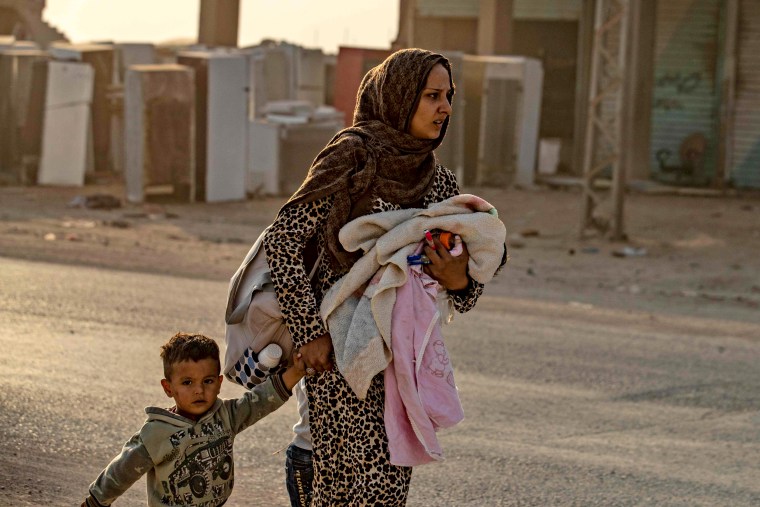LONDON — Governments across the world joined in condemning Turkey's military incursion into northeastern Syria as the conflict ran into its second day.
The European Union's foreign affairs chief, Federica Mogherini, in a statement released by Germany's foreign office, called on Turkey to stop its military action in Syria, to prevent undermining the stability of the region.
"Military action will indeed undermine the security of the coalition's local partners and risk protracted instability in northeast Syria, providing fertile ground for the resurgence of Daesh," she said, using an Arabic acronym for the Islamic State militant group.
Speaking on behalf of U.N. Secretary General Antonio Guterres, U.N. spokesperson Farhan Haq said: "Civilians and civilian infrastructure should be protected. The secretary-general believes that there's no military solution to the Syrian conflict."
British Foreign Secretary Dominic Raab said Turkish President Recep Tayyip Erdoğan's action "risks destabilizing the region, exacerbating humanitarian suffering, and undermining the progress made against Daesh."
Italy's Foreign Minister Luigi Di Maio said the Italian government "condemned" the Turkish operation and called for "an immediate end to this offensive which is absolutely not acceptable given that the use of force continues to endanger the life of the Syrian people."
In a statement Wednesday night, Egypt's foreign ministry said it "condemned in the strongest terms the Turkish aggression on Syrian territory."

The assistant secretary general of the Arab League, Hossam Zaki, said the Turkish campaign "constitutes an unacceptable attack on the sovereignty of an Arab member state of the League." The Arab League is set to gather at a special meeting Saturday to discuss the crisis.
Saudi Arabia also condemned the attack and "pointed out that the seriousness of this aggression on northeastern Syria has negative repercussions on the security and stability of the region, especially undermining the international efforts in combating ISIS organization."
Israeli Prime Minister Benjamin Netanyahu condemned what he called an "invasion" and warned against "the ethnic cleansing of Kurds by Turkey and its proxies," while offering the Kurds humanitarian help.
Iran's Foreign Ministry urged caution and called for an "immediate end to the attacks and for the withdrawal of Turkish forces from Syrian soil."
"The FM of the Islamic Republic of Iran understands Turkey’s security concerns, and, as already stated, believes that the military action would not only not diminish that country’s security concerns, but also cause financial and humanitarian damages," it said.
Russian Foreign Minister Sergei Lavrov, speaking at a meeting in Turkmenistan, said Russia understood Turkey's security concerns, but called for dialogue and urged Turkey to resolve its problems through the 1998 Ankara Agreement between Turkey and Syria.
Iran and Russia both said the United States was partly to blame for the situation in Syria that has led to Turkey's action.
Japan's foreign minister, Toshimitsu Motegi, said in a statement: "Japan is deeply concerned that the latest military operation would make the settlement of Syrian crisis more difficult and cause further deterioration of the humanitarian situation. Japan once again underscores its position that the Syrian crisis cannot be solved by any military means."
Australian Prime Minister Scott Morrison said his government was concerned about what the action meant for the Kurdish people and the potential resurgence of ISIS.
